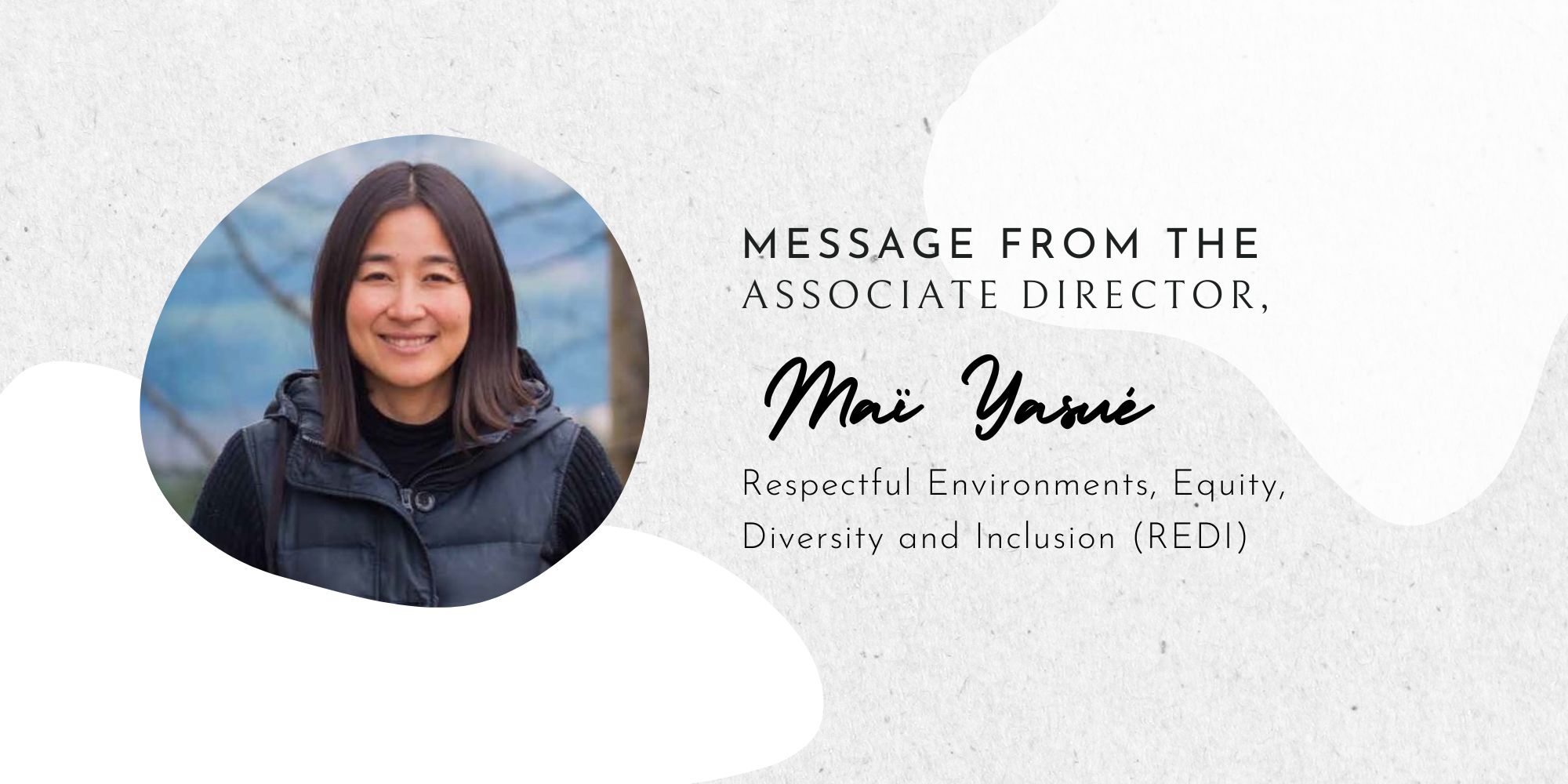Message from Maï Yasué, Associate Director, Office of Respectful Environments, Equity, Diversity, and Inclusion

October 24th, 2023
Dear colleagues,
I would like to take a moment to share my educational approach as I step into my new role as the Associate Director for the Office of Respectful Environments, Equity, Diversity, and Inclusion (REDI).
In my new capacity, I am committed to building collaborative relationships within the Dean’s office and with various EDI leaders across the Faculty of Medicine. Our primary objective is to empower and support units in the integration of equity, diversity, and inclusion principles into existing systems. As a first step over the past couple of months I have met with numerous clinical faculty, leaders, staff and faculty in order to gain a deeper understanding of your challenges and aspirations related to equity, diversity, and inclusion.
As we work towards strengthening the connections between the REDI team and the wider Faculty of Medicine (FoM), we are excited to embark on the following initiatives:
- Diversifying Our Educational Offerings:
We recognize that EDI journeys are unique, particularly in a diverse field like medicine. Our community encompasses individuals from different disciplines, roles, and past experiences. Therefore, we understand the need for diverse learning approaches. While some may benefit from traditional, facilitator-led “EDI 101” sessions, others may prefer action-oriented learning while collaborating on projects, and some may opt for resource-based learning and problem-solving tip sheets. Recognizing that EDI learning is an ongoing process and is relevant to individuals in various roles, our goal is to engage learners at their respective points in their journey and to provide a diverse range of media, formats, and content that can address the needs of people across a wide spectrum of roles.
- Creating Educational Resources through Partnerships:
Creating educational resources and sessions that are relevant, timely, and meaningful for individuals in various roles will necessitate collaborative efforts with different units across the Faculty of Medicine. We would like to extend an invitation to all of you to actively participate in co-designing and co-facilitating meaningful and relevant educational opportunities. We welcome your input on how we can enhance the relevance and scalability of our educational offerings. Additionally, we would like your input on the types of resources that can help leaders and EDI champions within units facilitate discussions and drive EDI-related changes within your work and learning environments. We aim to understand the specific challenges you encounter so that we can develop resources that are beneficial to you.
- Creating Spaces for Dialogue and Community-Building:
Achieving equity, diversity, and inclusion requires collective effort. We are dedicated to creating opportunities for community-building and group problem-solving to inspire meaningful change. For example, this could be in the form of faculty retreats for your units, or supporting communities of practices. Strong relationships within and between units serve as the essential foundation for socio-cultural change.
- Making the Work Relevant:
Even if you know the general direction your unit needs to be heading, it is still sometimes difficult to figure out how to action change. Through consultation and tailored sessions, we will help you connect EDI principles to your day-to-day activities, helping you understand how your actions contribute to collective change. We aspire to build bridges between broad and strategic goals related to Equity and Inclusion and the work of your roles and units. We aim to support you in setting realistic priorities and developing an action plan.
- Learning From Mistakes:
As the university continues the process of creating more equitable and inclusive environments that will attract more marginalized groups into our community, we are inevitably going to continue to make mistakes. We will help units move away from the paralysis caused by the fear of making mistakes to instead framing mistakes as an opportunity for growth. We hope to help units make the most out of mistakes and use them as an opportunity to build resilience and long term success. Our approach emphasizes empowerment, motivation and inspiration instead of shame and penalties.
- Embracing the Power of “Hot Moments”:
To help our team provide timely resources, we have identified a few hot moments for change. These hot moments can help to serve as catalysts for change, raising awareness, urgency, and diverse insights for working toward proactive solutions. Addressing equity and Inclusion in these hot moments can have deep and widespread impacts within your unit. In the coming months we hope to collaborate with the dean’s office and units and offer assistance in a few key areas. For example, these may include:- Recruitment and hiring processes for faculty and staff
- Equitable and inclusive process for admissions and adjudication of learners
- Transparent and equitable processes for performance reviews of faculty and staff
- Onboarding of faculty and staff
- Post-conflict
We eagerly anticipate working collaboratively to implement these strategies to affect more meaningful, impactful, and sustainable changes within the Faculty of Medicine and throughout the province. I am enthusiastic about the journey ahead and the potential for positive change. I invite you to engage in conversations to share your perspectives, concerns, and ideas on how we can collectively advance justice, equity, diversity, and inclusion at UBC.
I extend my gratitude for your unwavering commitment to this crucial work. Together, we can make a lasting impact.
Sincerely,
Maï Yasué,
Associate Director, Office of Respectful Environments, Equity, Diversity & Inclusion